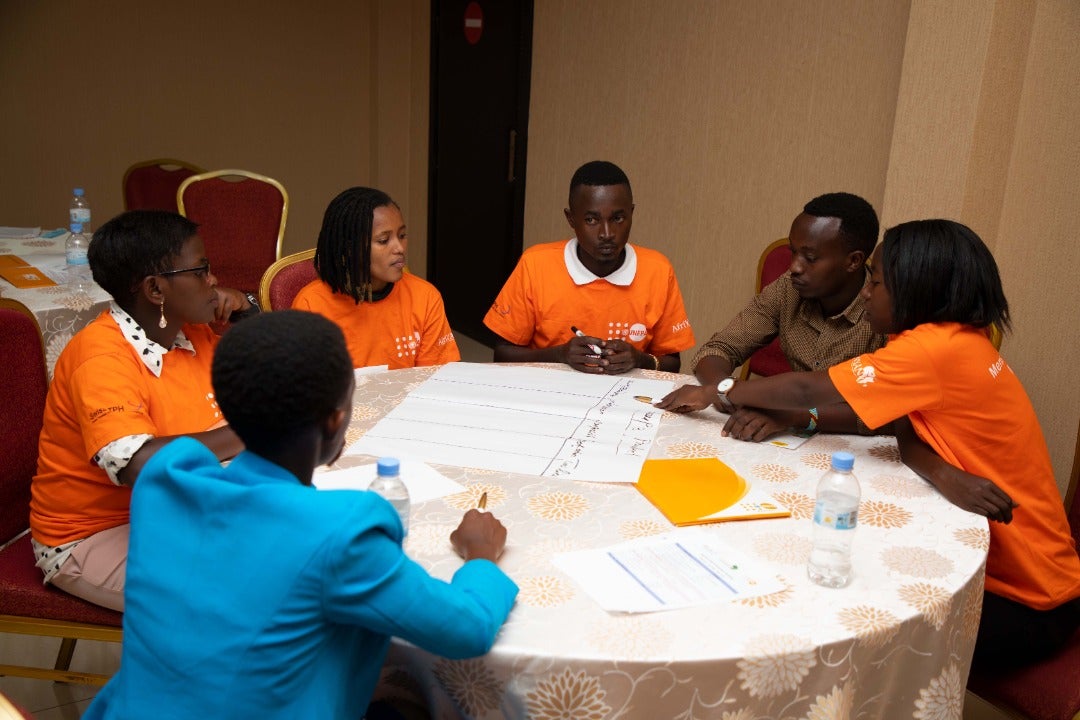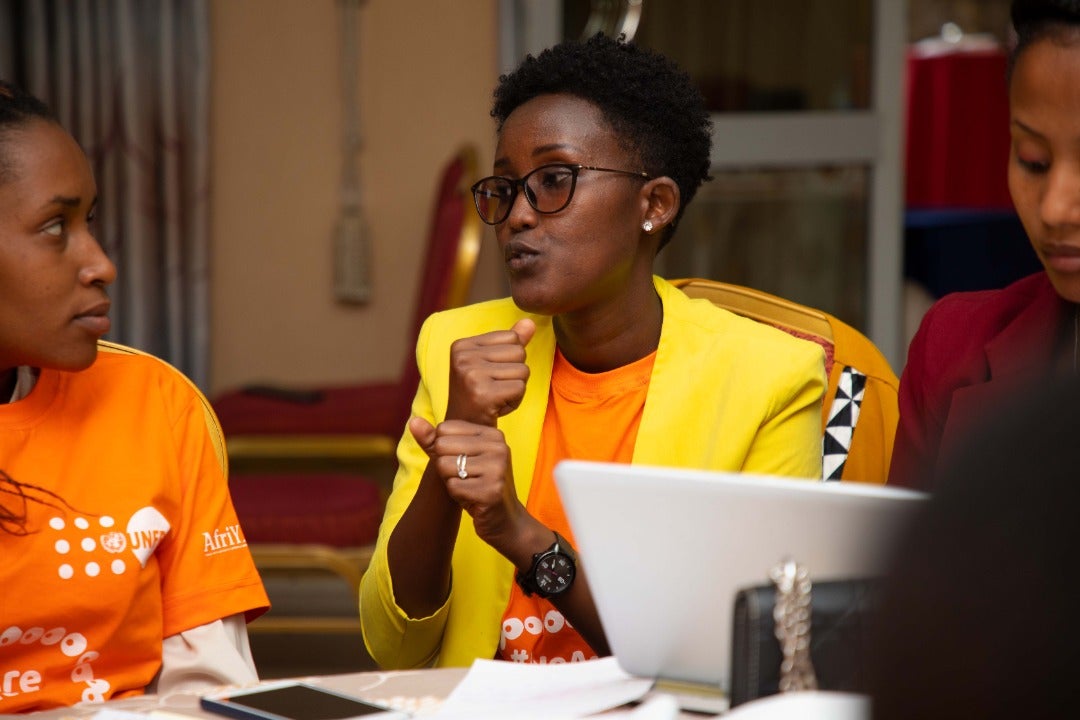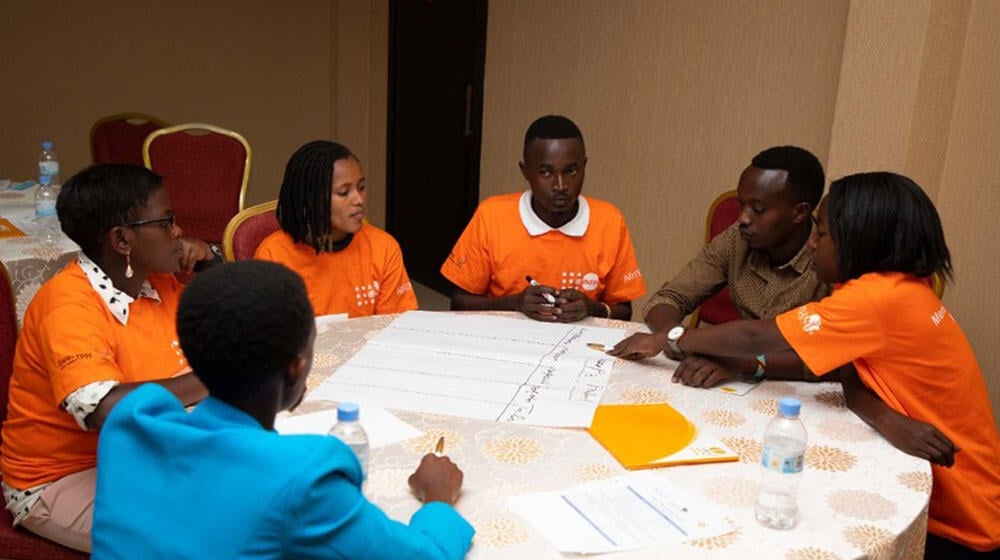Women and girls often know little about the changes they will experience as they advance through life. Many girls learn about menstruation only when they reach puberty, which can be a frightening and confusing experience. In addition, women do not feel free to talk about menstruation, because of the perception that it is dirty or shameful.
This belief contributes to restrictions women and girls face during vaginal bleeding, and some of those restrictions are self-imposed such as fear to participate in activities like school, athletics, or social gatherings. The taboo and stigma around menstruation reinforce discriminatory practices and affect gender equality.
“We are told and made to believe that menstruation is dirt, it is considered a taboo in our community and many girls are regarded as unclean going through their Menstruation period,” says Rachel Murekatete, a youth working with AfriYAN-Rwanda. Difficulty affording menstrual products can cause girls to stay home from school and work, with lasting consequences on their educations and economic opportunities. Quite a big number of girls especially in rural areas still find it hard to afford sanitary pads, as a result, some end up missing classes during the menstruation period.

During Menstrual Health management workshop held in Kigali, Youth discussed on issues around menstrual hygiene and possible solution to mitigate it. Photo @UNFPA Rwanda/May 2022
Murekatete says there is a need for concerned bodies to ensure not only those in school but all Women/Girls have smooth access to sanitary pads by ensuring that they are affordable. Also, put efforts into the implementation of washable or reusable pads.
“Menstrual Hygiene will ensure that you never run into potential situations of embarrassment and hence make you feel confident about yourself and your body,” she adds.
Marie Ange Raissa Uwamungu, another young lady says going through menstrual is a normal thing and society shouldn’t make it sound like dirt or unhygienic and some girls. She says when sanitary materials are made affordable to everyone, there will be no longer girls missing out on school because of their natural and normal situation.
Over the past decade, evidence has accrued worldwide about the many barriers girls face to safe, hygienic, and dignified menstruation. Some of the major setbacks have been established as limited or no information prior to the onset of menstruation; inadequate health education on menstruation and puberty. Besides, other challenges revolve around the lack of social support from teachers and peers to manage menstruation in school and from families, to insufficient access to water, sanitation, hygiene materials, and disposal facilities.
In Rwanda, the situation isn’t exceptional as World Bank statistics indicate that at least 20 percent of Rwanda's schoolgirls, particularly in rural areas, miss up to 50 days of school per year (Aime & Pugalenthi, 2020).’ For its basic schooling period, which runs from grade 4 to grade 6, the number of such days is about 540 days or one and a half.
According to the SHE campaign28, these absences represent a potential loss of GDP of US$215 per woman each year - a total of US$115 million per year in Rwanda (Akaliza, 2019).
UNFPA works to improve education and information about menstruation and related human rights concerns and reaches women and girls directly with menstrual supplies and safe sanitation facilities to ensure women and girls have access to clean material to absorb or collect menstrual blood and are able to change these materials in safety and privacy.
As part of the celebration of the Menstrual Hyigiene Day UNFPA Rwanda in partnership with Swiss Tropical, Public Health Initiative, and AfriYan held a two-day (23rd to 24th) Menstrual Health management workshop in Kigali, with the aim of analyzing the current situation in the country, and the way forward.
During this workshop, stakeholders active in the sector of Wash and menstrual health, representatives from the Ministry of Health, UN agencies as well as young leaders from different parts of the country, discussed the outcome of a rapid assessment done by Swiss Tropical and Public Health Institute on the status of Menstrual Health Management in Rwanda.
This assessment’s findings stipulate that 2.8 million menstruating females $215 in lost income per female per year, while 18 percent miss school because of no affordable pads, $115 million potential loss in GDP per year.
“Menstrual Health Management is on the basis of girls’ and women’s health and has many implications if not tackled correctly.” Said Kwabena Asante-Ntiamoah, UNFPA Rwanda Representative, at the opening of the 2 days Menstrual Health management workshop.
“We use moments like this, to discuss how to amplify the voices of women and girls on the challenges they face related to menstruation and raise awareness in order to change negative social norms around Menstrual Health, and engage decision-makers to increase the political priority and catalyze action for Menstrual Health at all levels” He added.

Menstrual Health Management is on the basis of girls’ and women’s health and has many implications if not tackled correctly. Photo @UNFPA Rwanda/May 2022
Looking into the situation
When it comes to Global Health and development, menstrual health is an important part of a woman’s well-being as it marks the transition from childhood to early adolescence with physiological changes that are crucial for the reproductive phase of a woman. The assessment revealed that although almost all children enroll in primary school, only 71 percent complete primary education. Non-tuition-related education expenses were cited as the major contribution to school dropout, especially for children from underprivileged households (Laterite, 2019). School is a critical place to acquire MHM knowledge and skills; dropping out means missed opportunities on destigmatizing and empowering girls in their MHM. From the assessment, gender was also highlighted as a key limiting factor in school attendance for girls.
“Even at school, teachers are not really interested in Menstruation topics, so girls keep a lot of things to themselves or, worse, get bad information from their peers.” Says Bertin,
It also came to attention that, lack of supportive WASH facilities during a girl’s menses leads to multiple days of absence, repeating classes, and eventually dropping out o school (Laterite, 2019; UNICEF and WHO, 2019).

Leaving No One Behind: The inclusion of people with disability in discussion on the challenges to menstruation health management and raise awareness in order to change negative social norms. Photo @UNFPA Rwanda/May 2022
Providing solutions
To address the needs of girls in a holistic manner, the Ministry of Education has initiated an innovative strategy to create 'Girls Rooms' or 'icyumba cy'umukobwa' in all schools in Rwanda. The above-mentioned strategy is well managed and observed as new draft law governing education in Rwanda, which makes it compulsory to have a Girl's Room in all schools, from primary to university. The Girl's Room provides a safe haven for any girl who has an unexpected period or any girl with menstrual problems. The room is supposed to be equipped with sanitary pads, towels, painkillers, a bed, water, and soap among other hygiene tools.
To make it accessible for every girl irrespective of their background, the school is advised to provide sanitary pads free of charge for those girls who cannot afford to buy them. To back up the above information, statistics from the Ministry of Education show that in 2019, 1,691 primary schools had a safe room for girls across the country, representing 57.1 percent of all primary schools in Rwanda.
In Rwanda, the government in partnership with development partners is putting in efforts to promote menstrual health management through the establishment and implementation of favorable policies. National school health policy, National sanitation Policy, National school health policy, and National Sanitation Policy are among the policies in place to help tackle the issue of menstrual health.
In addition to this, there is also an awareness campaign on breaking the Silence around Menstruation, the establishment of girls’ rooms in schools, and radio programs on MHM. From the research, among the recommendations, there is a need for girls' rooms must have sanitary pads, water, soap, spare underwear, pain medication, and an attendant.
There is also a dire need in promoting adolescents’ access to adequate MHM information, facilities, and commodities as human rights. In school, conducting more research on girls' rooms and MHM facilities, in general, should be considered, to inform policy and programming on progress and gaps especially in line with the national policies and towards achieving SDGs is important.
The story was published in partnership with The NewTimes


